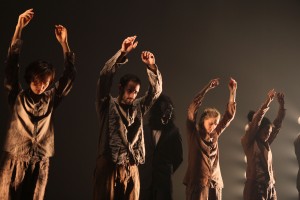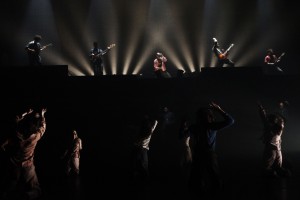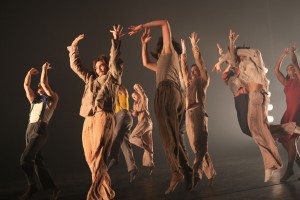By Rachel Straus
Hofesh Schechter is a slippery soul. In Political Mother, seen October 11 as part of Brooklyn Academy of Music Next Wave Festival, the Israeli-born choreographer cloaks his earnestness in irony. The 80-minute, 2010 work is structured through a series of blackouts in which 12 dancers and seven musicians evoke the demagoguery in politics, and entertainment.
The work pivots on three visions: the rock concert, with the rapper raging into his microphone above supplicants of fans. The military-style drummers, who appear in portals like a set of Kodak negatives, and who drive the dancers into waves of hyperkinetic motion. The tribe, who perform Hasidic-like folk dances, but with an intensity that beckons questions about their sanity. Dressed like prisoners, with arms raised in their air as though they are shackled from above, they not so subtly evoke those who lived in concentration camps.
Despite these visions, what stays in the mind about Politcal Mother are the slick production values and the deafening sound of Schechter’s pounding music.
Repetition is used to drive home Schechter’s theme: whether you are in Nazi Germany, present-day Williamsburg, Brooklyn or watching a James Bond movie (Daniel Craig was in the audience), it’s all the same. Humans behave like drones, they suffer like beasts, and one man will always rise to the top in attempts to control others.
So where is Mother in all this antic behavior? She is folk dance. In electric-yellow lights, at the dance’s end, we read the following words, “Where there is pressure, there is folk dance.” For Schechter, folk dance appears to be the universal form of protest against oppression. It’s where Schechter’s creativity and carefully cloaked earnestness lies.
In folk dance, Schechter rejects the current state of high art, opera house dance, the codified vocabulary of ballet, which historically in Western Europe was the sanctified form of dance expression. With folk dance, Schechter taps into populism. He can skirt between visions of the rock concert, the neo-nationalist volk of Leni Riefenstahl’s films (that helped consolidate Hitler’s power), and the zealousness of far-right religious fundamentalists. What’s notable is that these adopted visions are cynical ones. But, nonetheless, with folk vocabulary—the stamping rhythms, the democracy of the circle dance, and the erasure of gender (in Schechter’s use of it)—beats the heart of this Israeli’s artistry. Like a true postmodernist, Schechter isn’t able to openly love the folk dance he loves. He’s a choreographer in a cat’s cradle.
Throughout the work, I wondered how Political Mother could possibly end. With the cast going mad, the appearance of a masked gorilla, and two murder attempts by pistol, how could Schechter up the ante? The answer: Cinema technique. Schechter hits the rewind button. In less than five minutes, he gives us snapshots of the dance from end to beginning. Consequently the work opens, and concludes, with a Samurai-like warrior committing hari-kari with a sword that pierces his belly from front to back. Too bad this beginning didn’t get more laughs. Watching one male dancer with dreadlocks grunting and groaning from his self-inflicted wound was not a catharsis. It was a cartoon. Few got it. American audiences are indeed earnest.
Nonetheless, neo-folk dance is the wellspring from which many great choreographers (from Leonide Massine to Pina Bausch to Alexi Ratmansky) return for material. It’s a way of bringing concert dance back to the people, back to a human body that isn’t always upright and gloriously assured. In Political Mother, Schechter is on to something. Too bad he isn’t willing to tender his dancing credo with less ironic hyperbole.
In one notable section Schechter interpolates the music of Verdi—and—he leaves the stage empty. Solemnity, he seems to be saying, doesn’t include dance movement. Solemnity is reserved for sound, and in that respect Schechter may end up devoting more of his time to musical composition than to choreography.
Tags: Brooklyn Academy of Music, Daniel Craig, folk dance, Hasidic, Hofesh Schechter, Leni Riefenstahl, Nazi Germany, Next Wave Festival, Political Mother


